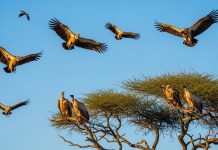The role of the Convention on International Trade in Endangered Species of Wild Fauna and Flora (CITES) in addressing wildlife trafficking is highly vital. Their priority list of endangered species makes it possible for them to liaise with governments in the fight against wildlife traffickers.
Kurt Duchez, the Counter Wildlife Trafficking Coordinator for the Wildlife Conservation Society (WCS) explained that having animals such as the Scarlet neck owl, Jaguar, and Sharks, in their appendix, among other endangered species, gives them recognition by the government and support law enforcement activities. Having these animals as their priority species benefits both the country and the government.
“These species were heavily trafficked and now they need protection,” Duchez said.
CITES is a global agreement among governments across the world to regulate or prohibit international trade in species under threat. The need for this agreement came into being as governments around the globe began to recognize that trade in some wild animals and plants had a damaging impact on those species. This category of plants and animals was being driven toward extinction through their unsustainable use for food, fuel, medicine, and other purposes.
CITES was signed into agreement in 1973 when 21 different countries came together in a collaborative effort to address the impacts of international trade in these species.
The Convention on International Trade in Endangered Species of Wild Fauna and Flora is made up of 184 member parties and trade is regulated in more than 38,000 species. Representatives meet every two to three years at a Conference of the Parties to review progress and adjust the list of protected species.
The Senior Policy Advisor, Species Conservation and Advocacy, Leigh Henry talks further on the significance of the convention when he said “The convention is one of the best tools we have for addressing international wildlife crime, and countries must hold each other accountable to make it effective”
Nigeria became a member of CITES on the 9th of May,1974. However, the country experienced a six-year ban from 2005 to 2011 because of the increase in illegal wildlife trade and a lack of adequate enforcement. The announcement to lift the ban was made in Geneva on the 26th of August 2011 during the 61st meeting of CITES (SC61).
Nigeria has since then designated the National Environmental Standards and Regulations Enforcement Agency (NESREA) as the country’s new CITES enforcement authority and has laid down new wildlife regulations that completely align with CITES provisions and can now be ranked in Category 1 under the CITES legislation project .

















